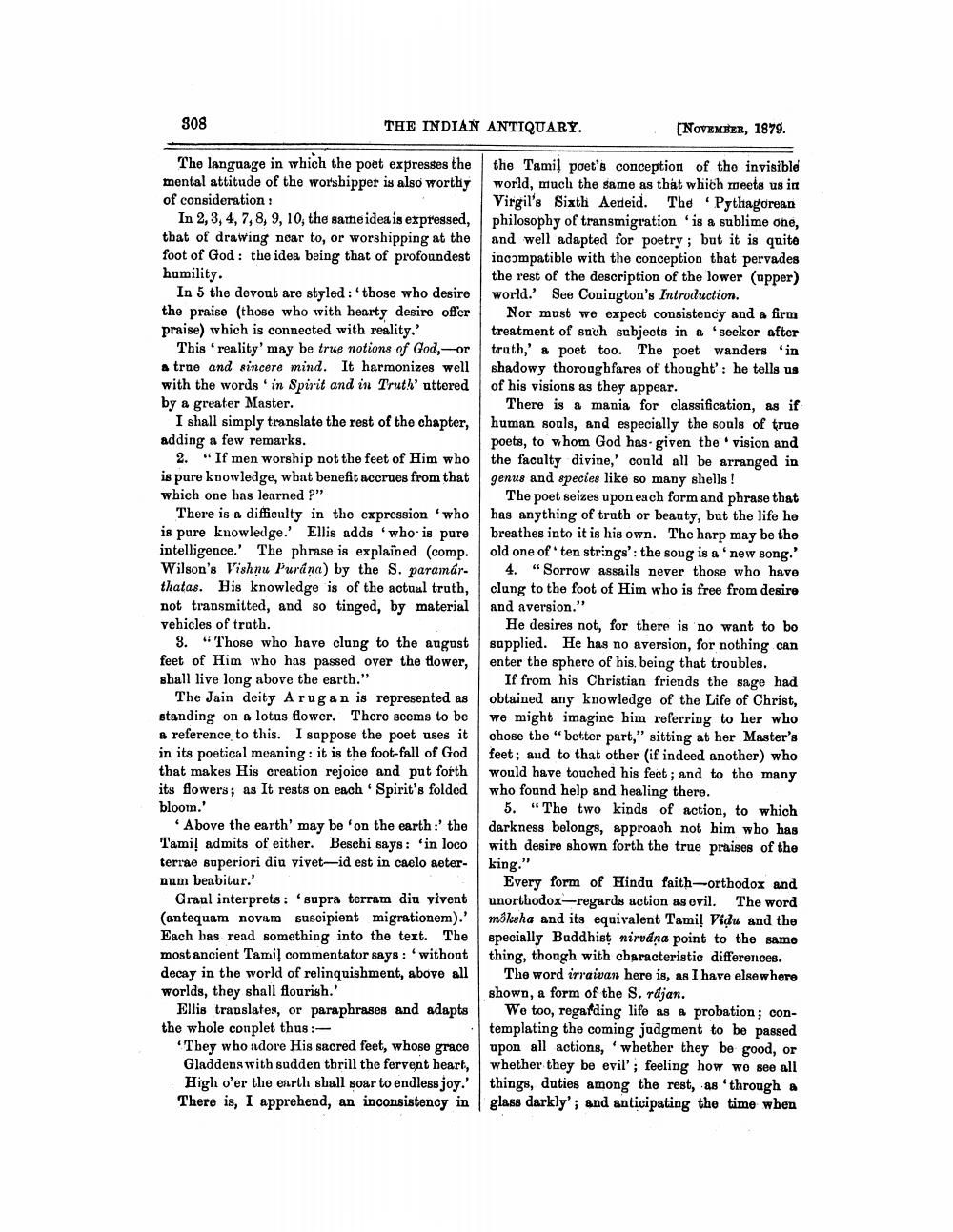________________
808
THE INDIAN ANTIQUARY.
The language in which the poet expresses the mental attitude of the worshipper is also worthy of consideration:
In 2, 3, 4, 7, 8, 9, 10, the same idea is expressed, that of drawing near to, or worshipping at the foot of God: the idea being that of profoundest humility.
In 5 the devout are styled: 'those who desire the praise (those who with hearty desire offer praise) which is connected with reality.'
This 'reality' may be true notions of God, or a true and sincere mind. It harmonizes well with the words in Spirit and in Truth' uttered by a greater Master.
I shall simply translate the rest of the chapter, adding a few remarks.
2. "If men worship not the feet of Him who is pure knowledge, what benefit accrues from that which one has learned ?"
There is a difficulty in the expression 'who is pure knowledge.' Ellis adds who is pure intelligence. The phrase is explained (comp. Wilson's Vishnu Purana) by the S. paramárthatas. His knowledge is of the actual truth, not transmitted, and so tinged, by material vehicles of truth.
3. Those who have clung to the august feet of Him who has passed over the flower, shall live long above the earth."
The Jain deity Arugan is represented as standing on a lotus flower. There seems to be a reference to this. I suppose the poet uses it in its poetical meaning: it is the foot-fall of God that makes His creation rejoice and put forth its flowers; as It rests on each Spirit's folded bloom.'
'Above the earth' may be 'on the earth:' the Tamil admits of either. Beschi says: 'in loco terrae superiori diu vivet-id est in caelo aeternum beabitur.'
Graal interprets: 'supra terram diu vivent (antequam novam suscipient migrationem).' Each has read something into the text. The most ancient Tamil commentator says: 'without decay in the world of relinquishment, above all worlds, they shall flourish.'
Ellis translates, or paraphrases and adapts the whole couplet thus:
"They who adore His sacred feet, whose grace Gladdens with sudden thrill the fervent heart, High o'er the earth shall soar to endless joy.' There is, I apprehend, an inconsistency in
[NOVEMBER, 1879.
the Tamil poet's conception of the invisible world, much the same as that which meets us in Virgil's Sixth Aeneid. The Pythagorean philosophy of transmigration is a sublime one, and well adapted for poetry; but it is quite incompatible with the conception that pervades the rest of the description of the lower (upper) world.' See Conington's Introduction.
Nor must we expect consistency and a firm treatment of such subjects in a 'seeker after truth,' a poet too. The poet wanders 'in shadowy thoroughfares of thought': he tells us of his visions as they appear.
There is a mania for classification, as if human souls, and especially the souls of true poets, to whom God has given the vision and the faculty divine,' could all be arranged in genus and species like so many shells!
The poet seizes upon each form and phrase that has anything of truth or beauty, but the life he breathes into it is his own. The harp may be the old one of ten strings': the song is a new song.'
4. "Sorrow assails never those who have clung to the foot of Him who is free from desire and aversion."
He desires not, for there is no want to bo supplied. He has no aversion, for nothing can enter the sphere of his. being that troubles.
If from his Christian friends the sage had obtained any knowledge of the Life of Christ, we might imagine him referring to her who chose the "better part," sitting at her Master's feet; and to that other (if indeed another) who would have touched his fect; and to the many who found help and healing there.
5. "The two kinds of action, to which darkness belongs, approach not him who has with desire shown forth the true praises of the king."
Every form of Hindu faith-orthodox and unorthodox-regards action as evil. The word moksha and its equivalent Tamil Vidu and the specially Buddhist nirvana point to the same thing, though with characteristic differences.
The word irraivan here is, as I have elsewhere shown, a form of the S. rajan.
We too, regarding life as a probation; contemplating the coming judgment to be passed upon all actions, whether they be good, or whether they be evil'; feeling how we see all things, duties among the rest, as 'through a glass darkly'; and anticipating the time when




